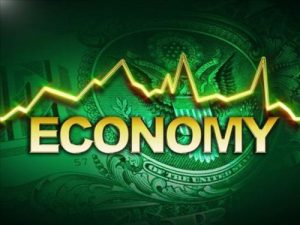(Akiit.com) As it did in 1992, the anti-Republican media is covering Trump‘s economy as negatively as possible while keeping a straight face. After all, unemployment is at historical lows, most Americans feel optimistic about their own economic future, and most credit Trump with the growing economy. Trump’s predecessor was the first president since 1949 to preside over an economic recovery without a single year averaging at least 3% gross domestic product growth.
But Democrats, the media and Trump-hating pundits seem almost giddy at the prospect of a recession.
Last year, multimillionaire comedian and HBO talk show host Bill Maher openly rooted for it: “Can I ask about the economy? Because this economy is going pretty well. … I feel like the bottom has to fall out at some point. And by the way, I’m hoping for it. Because I think one way you get rid of Trump is a crashing economy. So, please, bring on the recession. Sorry if that hurts people, but it’s either root for a recession or you lose your democracy.” In August, Maher doubled down: “I’m just saying we can survive a recession. We’ve had 47 of them. We’ve had one every time there’s a Republican president!” said Maher. “They don’t last forever. You know what lasts forever? Wiping out species! … Yes, a recession would be very worth getting rid of Donald Trump and these kinds of policies.”
After a less-than-expected number of jobs were created in August, many in the media spoke enthusiastically at the notion of a recession. Newsweek, for example, wrote, “The U.S. added just 130,000 jobs in August, falling short of economists’ expectations and stoking more fears of an impending recession.”
But we need to look at what a recession is and what happens in a recession to fully understand this. The National Bureau of Economic Research, the government’s official keeper of the business cycle, defines a recession as “a significant decline in economic activity spread across the economy, lasting more than a few months, normally visible in real GDP, real income, employment, industrial production, and wholesale-retail sales.” Others, like economist Lee Ohanian of the University of California, Los Angeles, define a recession as at least two consecutive quarters of negative economic growth. By either definition, the economy is not close to a recession.
But recently, The Washington Post eagerly noted: “Only one president since the Civil War has been reelected with a recession taking place in the two calendar years before facing voters a second time … William McKinley in 1900. Since then, all four presidents running for reelection who had such a recession lost: William Taft, Herbert Hoover, Jimmy Carter and George H.W. Bush.” Similarly, CNN political analyst Julian Zelizer wrote, “A recession is what could keep Trump off the list of two-term presidents and relegate him to the one inhabited by Herbert Hoover, Jimmy Carter and George H.W. Bush.”
One slight problem: By election day in November 1992, George H.W. Bush’s economy was on its 19th consecutive month of positive economic growth. The economy was nowhere near a recession. According to the National Bureau of Economic Research, the recession began in July 1990 and ended eight months later, in March 1991 — a full 19 months before Clinton’s election. Yet, as Investor’s Business Daily pointed out, in October 1992, over 90% of the economic news in newspapers was negative. The next month, Clinton won the election. And that month, only 14% of the newspapers’ economic news was negative. A 1992 Gallup poll found that a majority of Americans thought we were in a recession.
How big a role did the media play in this misperception?
In the 1997 book “Lessons From the Recession: A Management and Communication Perspective,” the authors write, “It is difficult to avoid the conclusion that the highly negative view of economy in 1992 was due in large part to widespread misperceptions about its performance and prospects, and that unduly negative coverage on network television played some major role in forming those misperceptions.” In short, the media’s bad-mouthing of Bush 41’s economy shaped Americans’ perception of it.
How strong was the economy Bill Clinton inherited? On Jan. 29, 1993, seven days after Clinton took office, a New York Times article headlined “U.S. Says Economy Grew at Fast Pace in Fourth Quarter” said, “The economy grew at a faster-than-expected annual rate of 3.8 percent in the final quarter of 1992, the strongest performance in four years, the Commerce Department reported today.” Three-point-eight percent! Not bad for a “recession.”
Had Hillary Clinton won the 2016 election and presided over an economy performing this well, the media would call her an economic maestro who “jumpstarted the economy” and whose reelection was all but a foregone conclusion.
Columnist; Larry Elder
Official website; http://www.larryelder.com









Leave a Reply